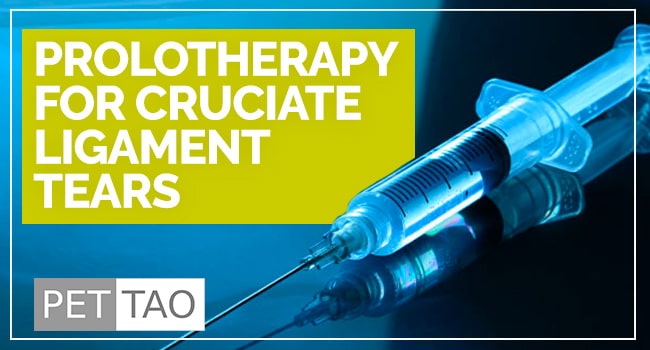Prolotherapy, also known as nonsurgical ligament reconstruction, is a medical treatment for cruciate ligament tears and the associated pain.
“Prolo” is short for proliferation.
The treatment induces the proliferation (growth, formation) of new connective tissue in areas where it has become weak.
Doctors primarily use prolotherapy to treat joint pain.
Prolotherapy also has been clinically proven to increase joint ligament strength by 30-40% in human clinical trials.
In addition, clinical results using prolotherapy in dogs appear to indicate the same response.
Many elite human athletes use this same method to strengthen their weak tissues to prevent future injury.
How Does It Work?
Here’s how prolotherapy treats weak or torn tendons and ligaments:
A tendon attaches muscle to bone, and ligaments connect bone to bone. Both are important for the stability and normal movement of joints.
A proliferant (a mild irritant solution) is injected into the affected ligaments or tendons causing a localized inflammation which “turns on” the healing process and directly stimulates the growth of new, strong, and healthy ligament and tendon tissue.
As the tendons and ligaments grow stronger and more capable of supporting and maintaining normal joint stability, the pain is alleviated.
Prolotherapy is also helpful for managing many different types of chronic musculoskeletal pain including:
- Arthritis
- Degenerative joint disease
- Torn ligaments, tendons, and cartilage
- Tendonitis
- Back pain
- Neck pain
- Partially degenerated or herniated intervertebral disks
Can My Dog Get Prolotherapy?
Prolotherapy can be performed on most dogs.
However, it is used most commonly in middle-aged to geriatric dogs.
Most owners report a 50-80% reduction in pain and improved locomotion within the first two treatments.
The protocol is an injection into the affected area every three weeks for a total of four injections.
The injections given frequently include a combination of dextrose, vitamin B12, and lidocaine.
Each practitioner has his or her own prolotherapy formula.
It is not a substitute for surgery.
All animals are not candidates for prolotherapy.
Surgeons evaluate each case on an individual basis.
It is suitable for:
- Animals with chronic osteoarthritic pain involving one or more joints
- Geriatric animals with chronic arthritis or joint pain, who are poor anesthetic candidates
- Animals with injury or tears of one or both anterior cruciate ligaments
- Performance animals (agility, working dogs) with ligament or tendon injuries
- Medication-sensitive animals or animals prone to adverse reactions to conventional pain medications (Rimadyl, Deramaxx)
- Prolotherapy is a great option for dogs with a torn cruciate ligament if they meet certain criteria.
Powerful Tools to Help Your Dog’s Ligament Challenges
There are many quick and easy changes you can make at home to help you give your dog an edge on easing tendon and ligament challenges.
- Learn more about torn ligaments and cruciate disease.
- Provide joint support. PET | TAO’s Harmonize Joint is a blend of Eastern herbs and Western supplements working together to lubricate and restore your dog’s joints.
- Ease your dog’s discomfort naturally. PET | TAO’s Comfort is a blend of Eastern herbs and Western supplements to soothe your dog’s arthritic challenges to make him/her more comfortable.
- Try PET | TAO Freeze Dried Beef Liver Treats. According to TCVM, liver controls tendons and ligaments. As few as 5-6 treats per day can make a huge difference in your dog’s tendon and ligament health!
- Try a Blood-building TCVM Diet. PET | TAO Zing dog food builds Blood. According to TCVM, Blood deficiency leads to ligament tears.
- Learn more about TCVM Herbal Remedies. Chinese medicine offers many amazing natural solutions for ligament and cruciate challenges. Some good examples are:








